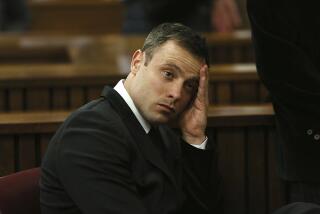South Africa appeals court overturns Oscar Pistorius’ verdict, convicting him of murder
- Share via
It was “a human tragedy of Shakespearean proportions,” said a South African appeals court judge, describing the life of double amputee athlete Oscar Pistorius, who inspired the world by overcoming his disability but fatally shot his girlfriend on Valentine’s Day 2013.
But despite the pathos of a story that captured global attention, the Supreme Court of Appeal on Thursday overturned Pistorius’ acquittal on murder charges, probably assuring that he will serve a hefty prison term.
The trial judge last year convicted Pistorius of the lesser charge of culpable homicide, or negligent killing, in the death of Reeva Steenkamp. He was sentenced to five years in prison and nearly two months ago was released from prison to house arrest.
NEWSLETTER: Get the day’s top headlines from Times Editor Davan Maharaj >>
The key to Thursday’s unanimous decision of five judges: Pistorius, well trained in weapons, must have known that someone would die when he fired four high-powered bullets through a closed door into a small toilet cubicle in his bathroom.
“He never offered an acceptable explanation for having done so,” said appeals court Judge Eric Leach, reading a summary of the judgment, which said Pistorius gambled with the life of the person in the cubicle.
“He must have foreseen and therefore did foresee that the person he was firing at behind the door might be fatally injured,” Leach said, adding that Pistorius ought to have been convicted of murder.
“The interests of justice require that persons should be convicted of the actual crimes they have committed, not of lesser offenses,” he said. “That is particularly so in crimes of violence.”
Leach said Thursday that the trial court found “with ample justification” that Pistorius was a very poor witness and his defense contained numerous contradictions.
“One does not really know what his explanation was for having fired the shots,” Leach said. There were “other inherent improbabilities” in Pistorius’ story, he added.
In the finding, the identity of the victim was unimportant. All that mattered was that Pistorius knew there was someone in the cubicle and he understood that firing four times could kill that person.
The trial judge, Thokozile Masipa, last year accepted Pistorius’ story that he fired believing the person in the cubicle was an intruder and that his life was in danger. But the Supreme Court of Appeals ruled that Masipa had made a fundamental error in law and failed to apply the correct legal test in reaching her finding: whether Pistorius foresaw his actions might kill.
In acquitting Pistorius, Masipa had relied on his comment that if he wanted to kill, he would have fired his bullets higher. But the appeals court found that Masipa’s reasoning was “confusing in various respects.” In reaching a verdict, the court must take into account all the evidence, and not ignore any of it — or a judicial process would be flawed, Leach said.
He said she failed to take into account the crucial evidence of a police ballistics expert, which was relevant to determining whether Pistorius realized his actions might kill.
In the end, it was Pistorius’ contradictions, and his insistence during the trial that he never intended to kill, that seemed to do his case the most damage.
Leach described Pistorius’ testimony about his thinking when he fired as “vacillating and untruthful.”
“At the outset he stated that he fired four shots ‘before I knew it’ and at a time when he was not sure if there was somebody in the toilet. This soon changed to a version that he had fired as he believed that whoever was in the toilet was going to come out to attack him. He later changed this to say that he had never intended to shoot at all,” Leach said.
The appeals court did not find that Pistorius intended to kill Steenkamp, and it didn’t interfere with the lower court’s rejection of the prosecution contention that he killed her after she locked herself in the cubicle during an argument.
Instead, the appeal centered on a form of intent in South African law: dolus eventualis. Under the principle, it is murder if a person foresees that his or her actions can kill someone but proceeds anyway.
A key part of Pistorius’ defense was that he felt vulnerable because he was not wearing his prosthetic legs. But the appeals court rejected this, finding that Pistorius was well-trained in the use of weapons and knew what he was doing.
Leach said there was no rational basis for Pistorius to believe his life was in danger, pointing out that the athlete failed to even take the precaution of firing a warning shot.
Under South African law, a person isn’t entitled to fire at an intruder in self-defense unless that intruder poses a direct threat, pointing a loaded weapon. Moreover, to mount a legal case of self-defense, an accused person must show that he or she intended to fire in self-defense. Pistorius insisted in court that he never had any intention to shoot.
The trial of a man who won international glory by overcoming his physical disability to compete in the Olympics has been followed obsessively around the world.
Steenkamp, a law school graduate who turned to modeling, had been dating Pistorius for a few months when she was slain.
Steenkamp left Pistorius a Valentine’s Day gift that he would open only months later, with a card telling him she loved him. But in the weeks before her death, she also sent him phone messages telling him that he sometimes frightened her and picked on her constantly.
Steenkamp’s mother, June, present for the finding, was in tears after the decision.
Leach said the court was entitled to set aside the conviction of culpable homicide and order a retrial, but the appeals court found that a retrial was not in the interests of justice and instead imposed the murder conviction.
Pistorius has already spent a year in jail, in the hospital wing of a Pretoria prison. The appeals court sent the case back to the High Court for a new sentence to be handed down, with the year that Pistorius has served to be taken into account. Prosecutors said they would study the judgment before deciding whether to seek Pistorius’ return to prison, pending sentencing.
In a brief statement, the Pistorius family said it would study the judgment before deciding on a course. The athlete could decide to appeal to the Constitutional Court.
“The legal team will study the finding and we will be guided by them in terms of options going forward,” the family statement said.
Twitter: @robyndixon_LAT
ALSO
No criminal charges for CHP officer seen punching woman in video
Suspects’ huge cache of bullets and bombs enough for ‘another attack,’ officials say
Israel announces arrests in arson attack that killed Palestinian toddler and parents
More to Read
Sign up for Essential California
The most important California stories and recommendations in your inbox every morning.
You may occasionally receive promotional content from the Los Angeles Times.













